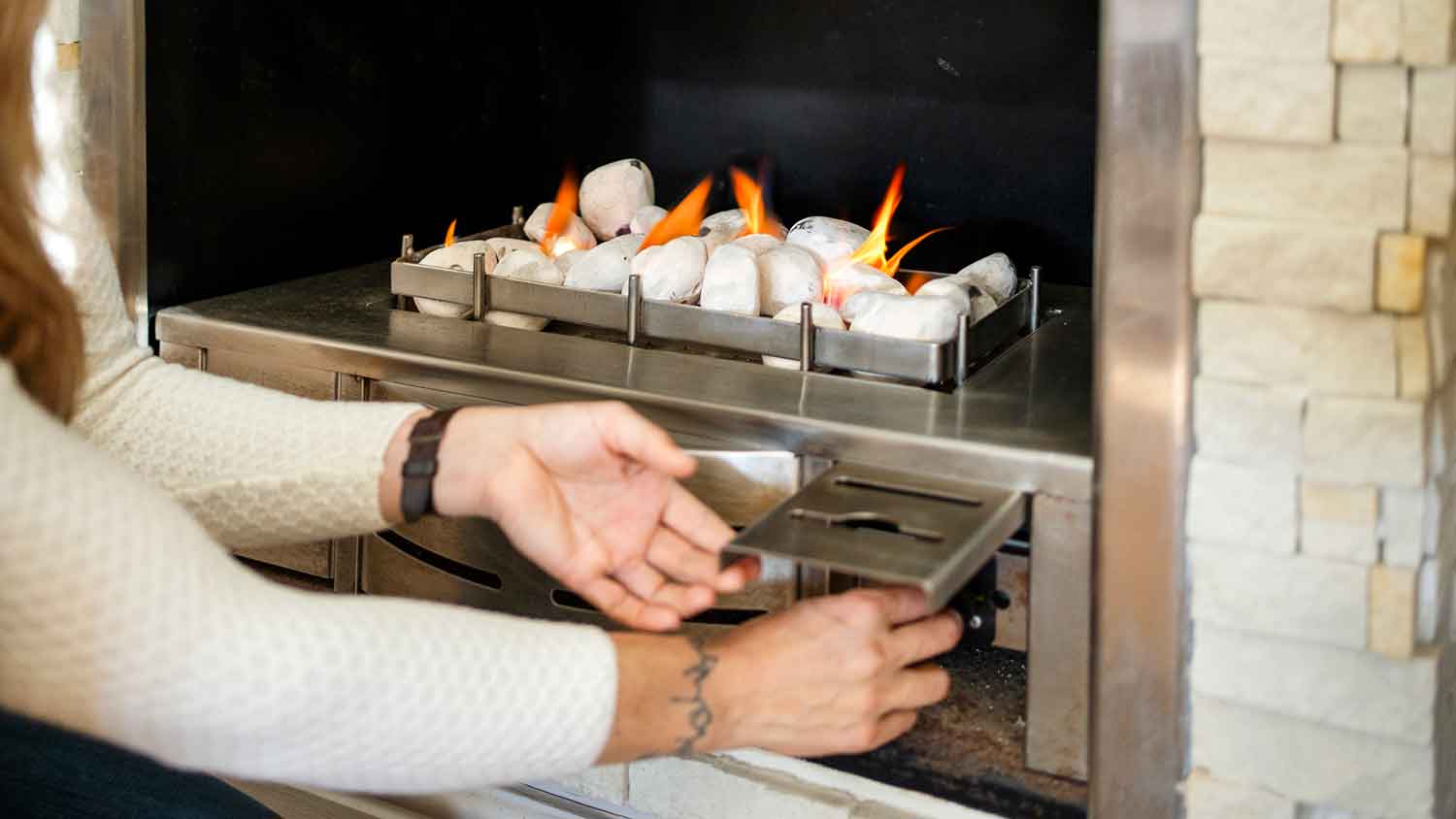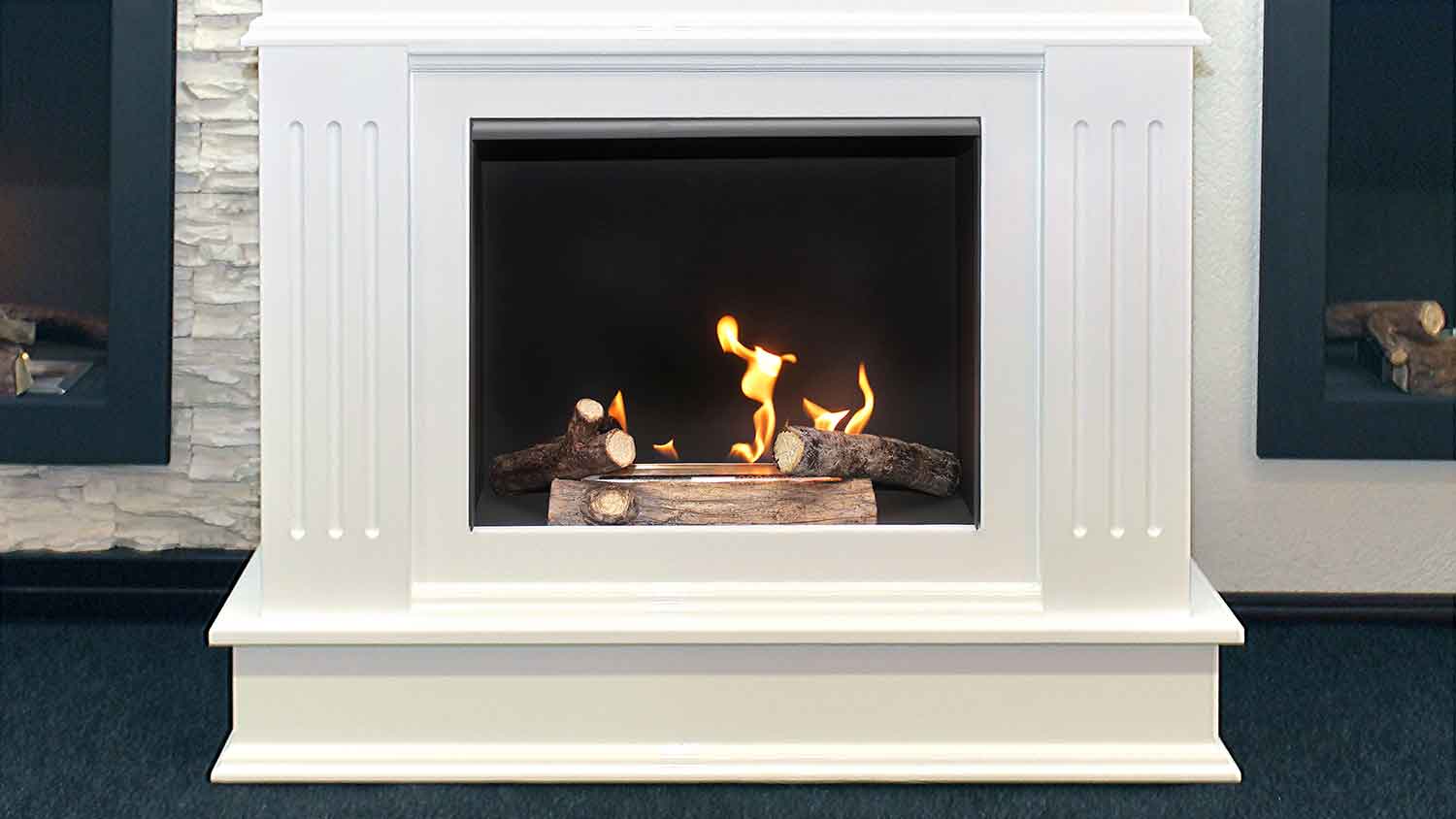
The cost of removing a fireplace insert depends on the type of insert that’s installed. Read on to learn why electric is cheaper than a gas or wood insert.
Just because it runs on gas doesn’t mean it should smell like it


New logs can take a few hours to stop emitting a gas or burning plastic odor.
A newly installed gas fireplace may offgas for the first 8 hours of use.
A gas smell may last for around 45 seconds after lighting the fireplace.
Have a pro inspect your chimney flue once per year.
Clean the fireplace about once per month to avoid gas or burnt plastic smells.
You turn on the gas fireplace to help heat up your living room, but rather than just enjoying the flickering flame, you start to notice an unpleasant smell. No, there aren’t rotten eggs in the room—that’s distinctly a gas smell coming from the fireplace. If your gas fireplace smells like gas, there can be a number of different problems. Shut off the fireplace and read on to learn about seven common reasons why your gas fireplace smells like gas and what steps to take next.
Gas is normally odorless, but it has additives that make it smell like rotten eggs to alert people when there’s a leak or other issue. If your gas fireplace smells like gas and it doesn’t dissipate, it could mean harmful gasses like carbon monoxide and nitrogen dioxide are leaking or backing up into your home. According to the U.S. Environmental Protection Agency, these gasses can lead to headaches, dizziness, confusion, lung disease, respiratory conditions, and some types of cancer. Gas leaks can also increase the risk of a fire or explosion, so if you smell gas, always have a pro inspect the fireplace immediately.
Although gas fireplaces use a pilot light or ignitor and fuel from the gas line to create a flame, you can add logs to give it the classic, cozy wood-burning look. But if you’ve just added new fireplace logs to your gas fireplace, they can let off a gassy or even plastic smell when heated by the flame.
If you’ve placed new fireplace logs in the gas fireplace and turned on the fireplace, give the new logs a few hours to warm up to their new home. If the gas smell is still present after four hours, it’s time to bring in a local fireplace pro for an inspection.
You’ve shelled out the cost to remove an old fireplace and installed a new gas fireplace and flue, but now you’re smelling gas. Like with new logs, a new fireplace needs time to acclimate, as some of the chemicals and materials in the fireplace may smell like gas or even burning plastic when they first heat up.
Run your new gas fireplace for about a day, with supervision, and consider opening some windows for ventilation. If the fireplace continues to smell like gas, it’s time to call in a fireplace pro to check for proper ventilation and potential leaks

Whether you have a new gas fireplace or use yours winter after winter, it’s always good to brush up on how to light a gas fireplace safely. You may be able to light the gas fireplace with the flip of a switch, or you may need to use a longer lighter to ignite a flame. When you light a fireplace, the gas line will emit a small amount of gas before it ignites, and this can cause the gas fireplace to smell like gas for a short time.
The smell should dissipate within about a minute, but if it doesn’t go away, shut off the fireplace and call in a pro as soon as possible.
At the end of winter, you may close your chimney flue and clean up your gas fireplace with the expectation that you won’t need it again until late fall. So when the chilly season arrives again and you’re prepping to start up the gas fireplace, you may forget to re-open the flue. This step is critical—the flue needs to be open to allow combustion gasses to vent out of the home.
Always make sure your flue is open before lighting a fireplace, and have a pro perform a chimney flue inspection at least once per year. This will help ensure your flue is clean and properly venting those harmful combustion gasses.
If your gas fireplace smells like gas or burning plastic, it may just be dust, pet dander, and other debris from the air being burned up by the fire. These tiny particles in the air can let off a burning plastic or other strange smell when the fire is burning. Of course, it can be hard to tell if this is really the issue, so always have a fireplace pro near you come by to inspect the fireplace if it starts to smell off.
Consider keeping an air purifier in the room where your gas fireplace is located to help mitigate air pollutants from burning in the fireplace.

A clean fireplace will burn more efficiently and will be less likely to emit strange odors. Be sure to learn how to clean a gas fireplace, including any logs or rocks, to remove debris and other buildup. Plan to clean your fireplace about once a month, especially in winter when it gets the most use.
Although a gas smell from your fireplace may be caused by something minor such as new logs, it can also be a sign of a major problem. The fireplace could have a gas leak, which can increase your risk of a fire, an explosion, or carbon monoxide poisoning. If there’s a gas leak, the fireplace may smell like gas even if it’s not turned on.
Because of these serious risks of gas leaks, if your gas fireplace smells like gas, it’s always safest to hire a fireplace pro for an emergency inspection.
Even if you think the gas smell could be from burning dust, don’t hesitate to call a pro to check the fireplace for any leaks, blocked vents, or other problems to keep your family safe.
You can expect to spend around $180 to $1,020 for the cost of fireplace repairs. If you need to revamp your fireplace for better ventilation and safer burning, leave the upgrades to a local fireplace remodeler, who can have you cozied up by the fire safely and quickly.
A gas smell is one of the most frequent reasons that homeowners reach out for fireplace maintenance and repair. Other reasons include improper ventilation and a fireplace that doesn’t produce enough heat. A professional can check your fireplace for safety issues, recommend necessary repairs, and perform preventative maintenance.
A slight gas smell in your gas fireplace is expected in a few circumstances, like when you just lit the fireplace or use new logs. However, a strong gas odor or another foul smell could be the sign of a larger problem—and can be prevented. Take the following steps to help prevent not only the unpleasant smell from entering your house but also the potential associated health risks from breathing it in:
Take preventative fireplace maintenance to help keep everything clean.
Schedule routine fireplace inspections at least once a year.
Check for visible signs of gas leaks, such as bubbling around connections, or call your local gas fireplace professional for an inspection.
Ensure the flue damper is fully open when using the fireplace.
Use an air purifier around your fireplace to help remove the smell from the air—but only after ensuring that there’s no more significant problem at hand.
I had Ace Fireplace Services install custom chimney caps for my home, and the results are stunning. They fit like a glove and have added a touch of sophistication to my chimney. I can't recommend their services enough.
Custom Paint Jobs LLC turned our outdated bathroom into a modern masterpiece.
Window Depot did an amazing job on my deck. I wasnt sure what I wanted to do, but their composite decking was affordable and will last a long time. I am excited to have family over, and I am no longer embarrassed by my backyard. Jeff and the ground crew were polite, respectful, and caring for...
We used Unique Hardwood Floor LLC three years ago to work on the floors of a 70 year old home that needed a great deal of work. Some floors needed repairs, some were replaced and others just needed to be refinished. It was a complicated job as they needed to blend the old and the new to...
He did a great job, gave a reasonable estimate and some advice and took care of the trees, they looked great when he was done. no muss, no fuss.
We visited their large showroom. Knowedgeable sale staff. They gave us various options. Installation was scheduled prompltly, and performed exactly as specified. My wife and I are extremely pleased with work, and went back to have them do the fireplace.
Person assisting us was very helpful and offered many suggestions
We decided to update our partially finished basement, with a budget. Gerald worked with me on the lighting and chair rail selections, and produced an end product that was everything we wanted and within our budget. The work was done quickly, and he and his crew were always prompt and...
Overall the work went well. We had some miscommunication over the damper, because of my lack of knowledge regarding fireplaces. When I pointed the issue out to New Buck they corrected the issue, and did not charge me. They were very clean, with their work considering how messy restoring a...
I WAS SO PLEASED THAT THEY WERE ABLE TO SOLVE THIS SO QUICKLY. I CAN'T BELIEVE THAT I WASTED ALL THAT TIME WITH MY ORIGINAL INSTALLER! I WILL NOW USE GUARANTEED FOR ALL MY FUTURE HEATING/COOLING NEEDS.
From average costs to expert advice, get all the answers you need to get your job done.

The cost of removing a fireplace insert depends on the type of insert that’s installed. Read on to learn why electric is cheaper than a gas or wood insert.

The up-front cost of an electric fireplace is lower than a gas or wood-burning fireplace. This guide will help you understand what you're paying for.

Use our guide to estimate your fireplace repair costs, based on the type of fireplace you have—and what part is broken.

If you’re preparing to install a prefabricated unit, here are the gas fireplace questions you should discuss with your contractor.

There are four fireplace types: wood-burning, gas, electric, and ethanol. The right one for your home depends on your desired aesthetic and level of upkeep.

Learn how to remove a fireplace insert, and create the cozy hearth of your dreams—in just 9 simple steps.